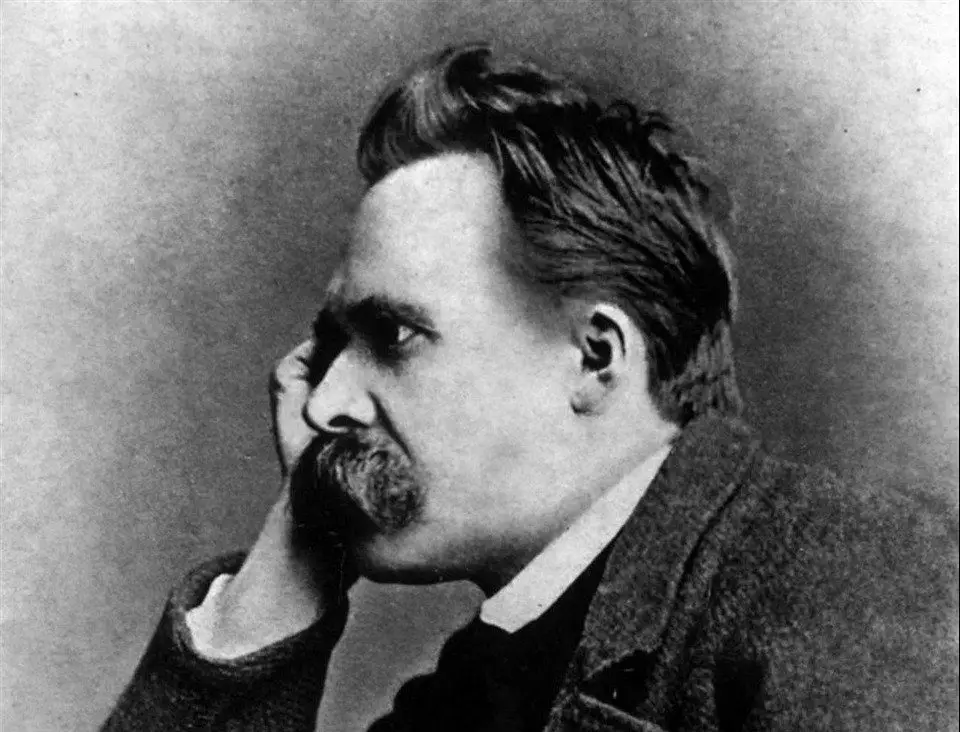Frederick Nietzsche, the 19th century German philosopher, transformed the fields of science and philosophy. His revolutionary ideas have drastically altered the history of modern intellectual thought, but during his lifetime, he amassed countless enemies with his antithetical beliefs toward religion and morality.
Following his renouncement of religion, he wrote a letter to his sister, explaining why he felt the need to leave the church. Nietzsche wrote, “Hence the ways of men part: if you want to strive for peace of soul and pleasure, then believe; if you wish to be a devotee of truth, then inquire.” Here are five ways that Nietzsche’s ideals can be applied to your own life.
1. Truth or Perspective: Examine other people’s points of view
Nietzsche’s search for moral truth in his life led him to question why humans feel the need to discover truth. He began his critique of truth by emphasizing that all life is perspective. He thought that because everyone’s life is different, their beliefs, judgments and actions will also differ. As our interpretations and judgments change, our perspective shifts, leading individuals to have different perceptions of morality.
This realization led Nietzsche to question why people feel the yearning for immutable laws to govern morality. Nietzsche asked himself the questions, “Why truth rather than perspective? Why certainty rather than more interpretation?” He postulated that our “will to truth” was not a natural desire.
Instead, Nietzsche believed that the human demand for rigid morality was a choice that we make out of fear, in order to convince ourselves that there is order in the universe. Nietzsche claimed that, because our “will to truth” forces us to base our beliefs in the perspectives of others, it glorifies the least creative parts of ourselves.
As America becomes increasingly polarized, the two political parties continue to drag their feet in the ground, refusing to shift their ideologies. In this age of internet misinformation, confirmation bias — the human tendency to interpret new evidence as confirmation of one’s previous beliefs — has become all too common. This fallacious way of thinking is maintained by one-sided news sources that bend the truth to attract people that think like them.
In these times of political uncertainty, we could all benefit from the wisdom of Friedrich Nietzsche. If we sought to understand other’s perspectives, instead of screaming at those we disagree with, we could move past our party differences.
Nietzsche realized that everyone’s values are different because they have distinctive perspectives. Everyone has different perceptions of life, so the truth is never black or white. People engaging in confirmation bias are obeying their “will to truth,” and subscribing themselves to a particular ideology, while ignoring other possible principles. Nietzsche teaches us that our beliefs should naturally change over time, as our judgments and perceptions of life change.
Instead of engaging in confirmation bias and believing only the facts that fit your narrative, attempt to gather facts from different perspectives. Nietzsche wants you to recognize that your “will to truth” is not a natural desire. Next time you think your beliefs are right and someone else’s are wrong, remember that your values may not coincide with theirs, but that doesn’t mean you can’t understand their perspective. Instead of judging their beliefs, interpret them, and try to figure out what led them to that way of thinking.
If you think someone’s beliefs are wrong, silencing them will only push them further away. The only way for us to come to a mutual understanding is by creating a more open discussion, focused on respecting varied perspectives.
2. Herd Mentality: Don’t believe things just because everybody else does
“What we’ve called universal values, what we have called truth, has always only ever been the personal expressions of those who promoted them.”
— Nietzsche
Nietzsche believed that universal morality is merely personal maxims that have been universalized for everyone to follow. He explains that the real values we hold are not based on the perspectives of others, but are expressions of who we are, and what feels powerful or life-giving to us. Nietzsche believed a rigid religious code creates what he called the “herd mentality.” Like a herd of animals, a herd mentality aims towards sameness, comfort and the preservation of its population.
The herd mentality puts the community over the individual, and limits creativity and independence. Nietzsche realized the universal codes he previously followed were nothing more than tools for enforcement, used by the herd to limit his free choices and individuality. Because universal morality requires us to adopt our beliefs from other’s perspectives, it limits our free expression and appeals to the least creative part of ourselves: the part that craves inflexible moral truth.
Rainer Maria Rilke was a poet during the late 19th and early 20th centuries whose writing was fueled by his fluctuating beliefs concerning an increasingly secular, war-torn Europe. Prominent Nietzsche themes appear in his poetry and, like Nietzsche, much of his work was not appreciated during his lifetime.
“All who seek you test you.
And those who find you, bind you to image and gesture.
I would rather sense you, as the earth senses you.
In my ripening, ripens what you are.”
— Rilke
In this poem, Rilke examines spirituality, and recommends that we broaden our view of what is considered pious. Building off Nietzsche’s view on universal codes of morality, Rilke suggests that most of the people who seek and find religion enact it as a group of rules to abide by, and to be confined to. Nietzsche believed that organized religions constrain people to a specific way of thinking, thereby limiting their intellectual freedom.
This is because they adopt the perspectives of others, who see God rigidly in “image and gesture.” They refrain from seeing God in different ways, thus restricting God’s influence on their lives. Rilke, like Nietzsche, believed that spiritual enlightenment could never be synonymous with conformity because enlightenment comes from the unknown, something you can sense but not conform to.
Instead of keeping your spiritual beliefs stagnant, try to evolve your spirituality and change it for the better when an opportunity presents itself. It is the changing perception of God, Rilke suggests, that changes people for the better.
3. “Will to Power”: Say yes to what gives you meaning
Nietzsche suggested that we can move past our “will to truth,” and free ourselves from the entrapment of the herd mentality, by becoming “beyond good and evil.” Instead of falling victim to our “will to truth” and borrowing the values of others, we should awaken our “will to power,” which is our passion and drive to create our life in the image of what we value.
Nietzsche’s philosophy proposes that we say yes to whatever gives us meaning in our own lives — the things we find value in personally. Many critics believe Nietzsche to be a promoter of anarchism because of his hatred of government and religion but, although his work has been frequently associated with anarchists, Nietzsche denied these claims.
I don’t think his goal was to demonize the values of those organizations. He was merely pointing out problems in the structures of government and religion. His philosophy doesn’t condemn specific values; instead, it condemns values that are adopted from others. Nietzsche maintained his criticism of organized religion throughout his life, but he also recognized that spirituality can grant immense value to some people’s lives.
Although some religious scholars see Nietzsche as an enemy to be disproved, I see him as someone who exposed obvious problems in religion because he wished for people to autonomously discover their own spirituality. His attacks on organized religion lead many spiritual folks to reject his insights, but his intention wasn’t for people to abandon spirituality. His philosophy was a renouncement of his faith, not an attack on the faith of others.
Although many religious individuals find his work repulsive, I believe you can appreciate Nietzsche and still find meaning in religion. Nietzsche preached individual freedom of belief, whatever that belief may be.
4. Prompting Renovations: Find your true values
Nietzsche’s ethics ask us to take a bold step. Eliminating our sources of truth in the world will most likely lead to nihilism, which is the belief that nothing has value or meaning. Many perceive nihilism as a negative or destructive perspective, but in contrast to the common view, Nietzsche believed nihilism is a prompting, or an opportunity that can enable us to reevaluate what gives value to our lives. Nietzsche believed that if we destroy our previous set of beliefs, and suffer the initial existential angst of nihilism, we can discover where our true values lie.
Many misinterpret his view as an endorsement of pessimism, but they couldn’t be further from the truth. His view enables someone to experience the full depth of their character. Nietzsche advises a revision of self but doesn’t require us to get rid of all of our past herd-built values. He is asking us to consider our existing values, as well as all other possibilities.
Nietzsche is not advising you to adopt a nihilistic outlook on life. He is saying that to find your own truths in life, you must first reject the truths given to you by the herd. To find value in your life, you cannot blindly follow the values of others. Next time you feel a loss of meaning in your life, interpret that depressed state as an opportunity for change. Instead of sulking in your perceived loss of self, realize that you feel that way because you avoided your true values. Look at nihilism as a gift that enables you to find true value by cleaning your slate of its narrow imitative beliefs.
5. The Greatest Weight: Don’t settle for comfort
“What, if some day or night a demon were to steal after you into your loneliest loneliness and say to you: This life as you now live it and have lived it, you will have to live once more and innumerable times more … Would you not throw yourself down and gnash your teeth and curse the demon who spoke thus?”
The greatest weight is a metaphorical situation put forth by Nietzsche. His goal was to make you think about what gives value to your life. Nietzsche’s hypothetical makes us ask ourselves if we would want to live eternally as we have been living. He proposes that most of us would “curse the demon.” The “greatest weight” is the feeling that crushes you into repeating past mistakes, and it is built from the unevaluated values you adopt from your herd.
Nietzsche suggests that “in every little thing ask yourself, do you desire this once more and innumerable times over?” If you change yourself and reevaluate your values, the weight can be lifted. However, if you remain under the same influences of the herd-prescribed guilt, you will become crushed under the weight, and submit to your unoriginal repetitive ways.
“His vision, from the constantly passing bars,
has grown so weary that it cannot hold
anything else. It seems to him there are
a thousand bars; and behind the bars, no world.
As he paces in cramped circles, over and over,
the movement of his powerful soft strides
is like a ritual dance around a center
in which a mighty will stands paralyzed.
Only at times, the curtain of the pupils
lifts, quietly–. An image enters in,
rushes down through the tensed, arrested muscles,
plunges into the heart and is gone.”
– Rilke
In Rilke’s poem “The Panther,” he observed a panther behind the bars at a zoo, insightfully comparing the panther’s will to live with that of mankind’s. This poem examines how “the greatest weight” confines humankind to a subservient state. Like the panther, mankind lives behind bars. The panther is held captive in a cell made from human ingenuity, while mankind’s personal jail cells are blandly pre-subscribed by social beliefs that captivate the wildness and individualism of the human spirit.
Humanity’s confinement is built from its defined limitations. The social norms and beliefs of an individual’s herd composes the bars of their prison, restricting that person’s actions, and inhibiting their freedom of original self-expression. Rilke, like Nietzsche, recognized that we can escape our enclosure of forced beliefs and awaken ourselves to what we value personally. But, upon realizing all the bars that stand in the way of our dreams, many of us submit to the comfortability of our cage.
When you feel overtaken by “the greatest weight,” don’t hide your wild aspirations in fear of them once again resurfacing. Break out of your self-made, herd-based enclosure and chase after the dreams that give meaning to your life.
















